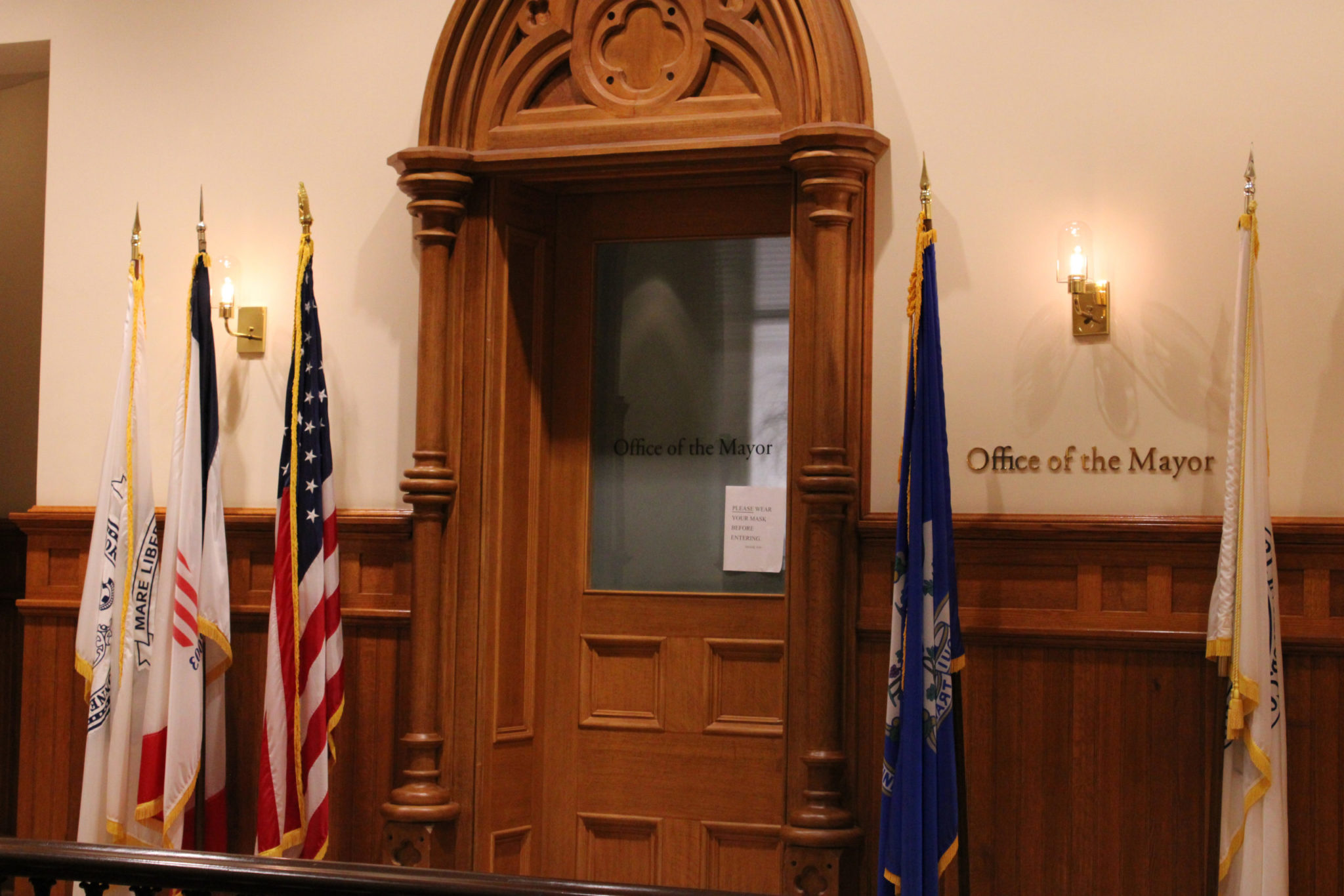Amid cultural affairs overhaul, city officials to roll out cultural equity plan by end of summer
Over a year in the making, the plan traces its roots to Mayor Elicker’s Transition Team.

Jessie Cheung, Staff Photographer
After becoming one of the focal goals of Mayor Justin Elicker’s 2020 Transition Team, a cultural equity plan is set to be rolled out in New Haven this summer.
At a press conference outside City Hall on Tuesday afternoon, city officials and members of the recently-appointed Cultural Equity Steering Committee announced the plan. Since last February, the city’s Department of Arts, Culture and Tourism has made efforts to promote “cultural equity,” which entails making the city’s culture scene affordable, accessible and justice-oriented, officials noted. The city hopes its equity plan will act as a capstone to their past work and a guide for Elm City cultural affairs in the coming years. According to Adriane Jefferson, director of the Department of Arts, Culture and Tourism, the core of the equity plan effort is to promote the voices of residents in the city’s arts scene.
“What we’re talking about here is inclusion,” Jefferson said at the press conference. “What we’re talking about is centering people, and redistributing power, and putting the power back to the people that it belongs to. When we look at governance, it feels like there’s this top-down approach. And the idea that we wanted to do within this department, and also what the people have been asking for, is to have a stake in governing.”
In January 2020, Elicker’s Transition Team urged his administration to “prioritize expanded cultural inclusivity in the arts” by assembling a team to reorganize how Elm City allocates funds to and approaches cultural efforts. The team, led by Transition Director and City Spokesperson Gage Frank and made up of a variety of city officials and residents, announced that the city’s plan should work toward “the prioritization and elevation of local talent.” The team’s report also called for a reimagining of the Department of Arts, Culture and Tourism.
According to Jefferson, the city has made strides towards its goal of increased inclusivity in the arts over the past year. The department has spawned several initiatives since the beginning of the Elicker administration, including an “Arts for Anti-racism” pledge aimed at holding institutions accountable to their anti-racism commitments, a Creative Sector Relief Fund to fund low-income artists and small nonprofits and “Unapologetically Radical,” a February event purposed around using art “to bring about transformative change.”
“When we looked internally, we were looking for ways to be responsive right now and not wait for the cultural equity plan to be done,” Jefferson said of the programming. “We have to respond now.”
To help draft the plan, the city partnered with New Haven’s Civic Impact Lab, a policy thinktank focused on anti-racist programs, and Hester Street, a New York-based community development nonprofit. The city has been working on the equity plan since last February.
Lab team member Elizabeth Nearing said that work on the equity plan focuses on issues that the Civic Impact Lab has experience with through their labs, which bring together around 40 New Haveners to dive into social justice work. She also noted that the equity plan is meant to challenge New Haveners to be open to a new vision for city arts projects.
“Several of our core values define our approach,” Nearing said of the Civic Impact Lab. “That includes dismantling systemic racism … We want to create space to imagine — to imagine what hasn’t existed before and to weave together things that already do exist. We believe that awakening joy can catalyze transformative change.”
To work on the plan, the city reached out to over 100 residents to create a group that was “representative of the neighborhoods, artistry and lived experience of our city,” Civic Impact Lab member Eric Rey said. At the press conference, several members of the new Steering Committee spoke about what cultural equity means to them.
For long-time New Haven resident and ACLU field organizer Anderson Curtis, the invitation to join the group was meaningful because he had never before felt so included in a citywide effort.
“I’ve lived in New Haven for most of my life, yet this is the first invitation that I’ve recalled to [work on] equity,” he said. “My life experience is more about inequity than equity… Equity has to be more than words on paper. It has to be more than words painted on a street. Equity must visit all neighborhoods in the city.”
The next steps for the Steering Committee will be to hold several public meetings this spring to welcome public input. The city will also be distributing a survey in the coming week to hear from residents about what they want to see in the plan, which a press release from the mayor’s office stated could include any efforts that work toward a more culturally equitable New Haven, “in all facets of government, institutions and community.” Curtis said at the press conference that the process is less about calling out people to fix the arts scene, and more about welcoming the community into the process.
“I’m not calling people out,” he said. “I’m calling people in.”
Hope Chavez, a new resident of the city and a member of the Steering Committee, told those at the announcement on Tuesday that those on the committee will seek to bring their various perspectives to the role.
“I’m a queer Latina from Texas with lineage that carries both the blood of the colonizer and the colonized,” she said. “I’m a theatrical producer, I’m a community facilitator. I want you to know the stories of those on this co-creation team… My identity is inextricably linked to who I am and what I do.”
Present at Tuesday’s event, Elicker stressed the importance of the arts, not just to the community but to his own family.
“Arts and culture are about humanity,” Elicker said. “it allows us to express ourselves, it allows us to engage with someone and make ourselves vulnerable, to share some emotion that we may often not find the words to share. I play the guitar, and the connection that I feel with my family when we sing songs together is something that we don’t access in other ways.”
The first public meeting on the equity plan will be on May 18.










